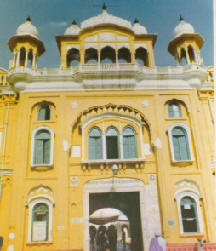Gurdwara Janam Asthan Guru Nanak Dev: Difference between revisions
m (Added category) |
Allenwalla (talk | contribs) m (Maharit to Mahant / sahajdhari (unbaptised) Siridhi Sikhs--all correct? ah - Sindhi!) |
||
| Line 1: | Line 1: | ||
[[Image:Gurud Janamasthan.jpg|thumb|right|300px]] | [[Image:Gurud Janamasthan.jpg|thumb|right|300px]] | ||
This shrine representing the home of Baba Kalo and Mata Tripta, father and mother respectively of Guru Nanak Dev, where the Guru was born, was established by Baba Dharam Chand (1523-1618) son of Baba Lakhmi Das and grandson of Guru Nanak Dev. The shrine must have been established before the end of the sixteenth century because Guru Arjan Dev (1563-1606) is believed to have visited it. Its present building comprising a square, domed sanctum with a rectangular pavilion attached to it within a vast walled compound was built by Maharaja Ranjit Singh ( | This shrine representing the home of Baba Kalo and Mata Tripta, father and mother respectively of Guru Nanak Dev, where the Guru was born, was established by Baba Dharam Chand (1523-1618) son of Baba Lakhmi Das and grandson of Guru Nanak Dev. The shrine must have been established before the end of the sixteenth century because Guru Arjan Dev (1563-1606) is believed to have visited it. Its present building comprising a square, domed sanctum with a rectangular pavilion attached to it within a vast walled compound was built by [[Maharaja Ranjit Singh]]. | ||
Several other buildings were added after the S.G.P.C. took over control on 21st February 1921, the day following the massacre of 150 to 200 peaceful Sikhs by [[Mahant Narain Das]] and his hired assassins. The Mahant was aided in arming his private force of gundas (goons) by the local British authorities who had long resisted the Sikhs' requests to control the management of their own houses of worship. | |||
The traditional fair which was held here to celebrate the birth anniversary of Guru Nanak Dev continued with great eclat until Britain's 1947 Partition of India. Since that year the Pakistan government had permitted only 15 Sikhs to stay at Nankana Sahib to carry out routine services at the shrine, but their number was reduced to a bare five in 1968 and, still later, to a solitary [[Granthi]] who maintains a token attendance with the help of some sahajdhari (unbaptised) Sindhi Sikhs. Thrice a year, on Baisakhi (April), death anniversary of Maharaja Ranjit Singh (June) and birth anniversary of Guru Nanak Dev (November), the Pakistan government allows Sikh jathas, a few hundred strong each, to visit this and other shrines at Nankana Sahib, Panja Sahib and Lahore. | |||
According to Waliullah Khan's, ''Sikh Shrines in West Pakistan'', there is a sacred relic, Chola Sahib, preserved in Pakistan. The relic is a cloak with Quranic verses embroidered on it supposed to have been presented to Guru Nanak Dev by the ruler of Baghdad during the Guru's visit to that city. | |||
If there is such a relic (old Sikh documents make no mention of it), it is a fake relic, because the Chola Sahib believed to be the real one is preserved at Dera Baba Nanak in Gurdaspur district of the Indian Punjab. | |||
[[Category:Gurdwaras in Pakistan]] | [[Category:Gurdwaras in Pakistan]] | ||
[[Category:Pakistan]] | [[Category:Pakistan]] | ||
Revision as of 23:18, 24 May 2008
This shrine representing the home of Baba Kalo and Mata Tripta, father and mother respectively of Guru Nanak Dev, where the Guru was born, was established by Baba Dharam Chand (1523-1618) son of Baba Lakhmi Das and grandson of Guru Nanak Dev. The shrine must have been established before the end of the sixteenth century because Guru Arjan Dev (1563-1606) is believed to have visited it. Its present building comprising a square, domed sanctum with a rectangular pavilion attached to it within a vast walled compound was built by Maharaja Ranjit Singh.
Several other buildings were added after the S.G.P.C. took over control on 21st February 1921, the day following the massacre of 150 to 200 peaceful Sikhs by Mahant Narain Das and his hired assassins. The Mahant was aided in arming his private force of gundas (goons) by the local British authorities who had long resisted the Sikhs' requests to control the management of their own houses of worship.
The traditional fair which was held here to celebrate the birth anniversary of Guru Nanak Dev continued with great eclat until Britain's 1947 Partition of India. Since that year the Pakistan government had permitted only 15 Sikhs to stay at Nankana Sahib to carry out routine services at the shrine, but their number was reduced to a bare five in 1968 and, still later, to a solitary Granthi who maintains a token attendance with the help of some sahajdhari (unbaptised) Sindhi Sikhs. Thrice a year, on Baisakhi (April), death anniversary of Maharaja Ranjit Singh (June) and birth anniversary of Guru Nanak Dev (November), the Pakistan government allows Sikh jathas, a few hundred strong each, to visit this and other shrines at Nankana Sahib, Panja Sahib and Lahore.
According to Waliullah Khan's, Sikh Shrines in West Pakistan, there is a sacred relic, Chola Sahib, preserved in Pakistan. The relic is a cloak with Quranic verses embroidered on it supposed to have been presented to Guru Nanak Dev by the ruler of Baghdad during the Guru's visit to that city.
If there is such a relic (old Sikh documents make no mention of it), it is a fake relic, because the Chola Sahib believed to be the real one is preserved at Dera Baba Nanak in Gurdaspur district of the Indian Punjab.

